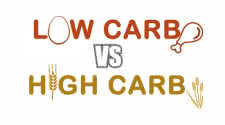What is Better for Fat Loss: High or Low Carbohydrate Diets / Meal Plans

Low Carbs or High Carbs for Weight Loss - Your Decide!
Judging by the responses of many competitive bodybuilders, a lower carbohydrate intake appears to be back in vogue. Such diets
were popular about 20 years ago, but fell into disfavor with the advent of higher carbohydrate and lower-fat diets. However,
recent recognition of the potential fat-promoting effects fostered by an out-of-whack carb/insulin ratio has once again made
reducing carb intake attractive.
A new study, published in the American Journal of Clinical Nutrition (63:174-8, 1996), examines the efficacy of higher versus
lower carb intakes for weight loss. The study involved 43 adults during six weeks of hospitalization. These people, however, did
exercise during that time. They followed one of two diets: a low-carb diet (32% protein, 15% carbs and 53% fat) or a high-carb
version (29% protein, 45% carbs and 26% fat). Both diets consisted of a total of 1,000 daily calories.
Results showed no significant differences in either weight or fat loss between the two diets. However, for those on the lower-carb
diet, blood levels of insulin, fasting glucose, cholesterol and triglycerides (fat) decreased. On the high-carb plan, neither
insulin nor triglycerides decreased at all.
The curious thing about this study is that the researchers considered the significant decreases in insulin, cholesterol, etc., to
be of no importance! What planet are they living on? A decrease in insulin levels alone is a boon for dieters, since insulin is
the most potent fat-promoting hormone in the body.
As noted, since the primary goal of low-carb diets is to decrease insulin levels, such diets would have to be considered the
winner in this contest, despite the myopic observations of the researchers who designed this study.
When all is said and done, the calorie factor is still preeminent when it comes to losing fat. But since lower resting insulin
levels will usually promote decreased appetite, decreased carb intake is more effective than high-carb consumption.